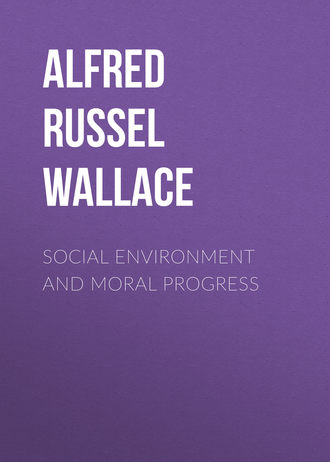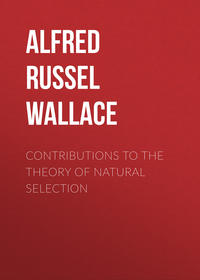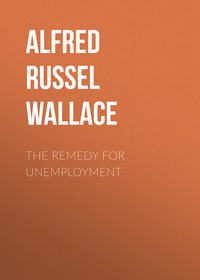 полная версия
полная версияSocial Environment and Moral Progress
In a remarkable essay, first published in 1852, H. Spencer, with his usual philosophical insight, examined the facts of reproduction and population throughout the whole of the animal kingdom, and showed that the duration of the individual life and the increase of the race varied inversely, those groups which have the simplest organisation and the shortest lives producing the greatest number of offspring; in other terms, individuation and reproduction are antagonistic. But individuation depends almost entirely on the development and specialisation of the nervous system, through which alone all advance in instinct, emotion, and intellect is rendered possible. The actual rate of increase in man has been determined by the necessities of the savage state, in which, as in most species of mammals, it is usually what is just required to maintain a limited average population. But with a true advance in civilisation the average duration of life increases, and the possible increase of population under favourable conditions becomes very great, because fertility is greater than is needed under the new conditions. At present, however, no general advance in intellectuality has taken place; but that the facts do accord with the theory is indicated by the common observation that highly intellectual parents do not have large families, while the most rapid increase occurs in those classes which are engaged in healthy manual labour.
But a law founded on such a broad physiological basis of observation is sure to continue in action, and we may therefore feel certain that as the intellectual level of the whole race is raised by general culture and physical health, the law of diminishing fertility will act, and will tend in the remote future to bring about an exact balance between the rate of increase and that of mortality.
A more immediate and effective check to rapid increase of population will, however, be brought about by the social reforms already suggested. When poverty is abolished and neither economic nor social advantages will be gained by early marriage, there can be no doubt it will be generally deferred to a later age. Still more effective will be the extension of the period of education or training for the whole population for several years longer than at present, together with the growth of public opinion against all marriages between persons who have not yet begun the serious work of life. It would also be an essential part of education to inculcate the delay of marriage till every opportunity has been afforded both of the parties concerned of becoming thoroughly acquainted with each other before undertaking so serious a responsibility as marriage usually involves.
The effect of even a few years' delay of marriage on population is very considerable. Sir F. Galton has shown from the best statistics available that if we compare women married at twenty with those at twenty-nine, the comparative fertility is as 8 to 5. But this does not represent the whole effect on increase of population. When marriage is delayed, the time between successive generations is correspondingly increased; and yet another effect in the same direction is produced by the fact that the greater the average age of marriage the fewer generations are alive at the same time, and it is the combined effect of these three factors that determines the actual increase of the population due to this cause.
Sir F. Galton gives a remarkable table showing this combined result of these causes. He finds that if one hundred mothers and their daughters in each successive generation marry at twenty, there will be an increase of such mothers in each successive generation of 1·15. If, however, they marry at twenty-nine, each successive generation of mothers diminishes in the proportion of 0·85. If this goes on for 108 years, the hundred mothers who marry at twenty have increased to 175, and in 216 years to 299; while those who marry at twenty-nine will have decreased to 61 and 38 respectively. It is therefore shown that under present social conditions the age of marriage necessary to preserve a stationary population will be somewhere between twenty and twenty-nine. The above figures are, however, founded on special cases, and the actual facts are so complicated by the number of childless marriages, the rate of infantile mortality and other causes, that they must be taken only as establishing a law of rather rapid decrease of fertility with each year's addition to the average age of marriage of the mother.
I have now, I venture to hope, established two important principles in relation to human progress. In the first place, I have shown that modern ideas as to the necessity of dealing directly with some of our glaring social evils, such as race degeneration and the various forms of sexual immorality, are fundamentally wrong and are doomed to failure so long as their fundamental causes—widespread poverty, destitution, and starvation—are not greatly diminished and ultimately abolished. I have proved that human nature is not in itself such a complete failure as our modern eugenists seem to suppose, but that it is influenced by fundamental laws which under reasonably just and equal economic conditions will automatically abolish all these evils.
In the second place, I have shown that the dread of over-population as the result of the abolition of poverty is wholly and utterly fallacious—a mere bugbear created by ignorance of natural laws and of presumption in thinking that we can cure social evils while leaving the man-made causes which produce them unaltered. The three great natural laws which all our would-be reformers ignore are:—
(1) That a very moderate advance in the average age of marriage—which would certainly result from a truly rational system of education combined with economic equality—necessarily diminishes the rate of increase of the population.
(2) That every approach to educational and economic equality by effecting a large saving of the lives of males who now die from preventable causes, combined with the fact that male births exceed those of females, would so diminish the number of the latter that they would soon become less instead of, as now, more than that of males: that this would give them an effective choice in marriage which they do not now possess, together with the power of delay which for many reasons large numbers of them would exercise.
(3) The law of diminishing fertility with increase of brain-work through education and training would further tend to the diminution of fertility.
These three natural causes all tend in one direction—the equality of births with deaths; while their action would be so readily modified by public opinion as to obviate all danger of either increase or decrease beyond what was necessary for the well-being of each community, nation, or race.
The Future Status of WomanThe foregoing statement of the effect of established natural laws, if allowed free play under rational conditions of civilisation, clearly indicates that the position of woman in the not distant future will be far higher and more important than any which has been claimed for or by her in the past.
While she will be conceded full political and social rights on an equality with man, she will be placed in a position of responsibility and power which will render her his superior, since the future moral progress of the race will so largely depend upon her free choice in marriage. As time goes on, and she acquires more and more economic independence, that alone will give her an effective choice which she has never had before. But this choice will be further strengthened by the fact that, with ever-increasing approach to equality of opportunity for every child born in our country, that terrible excess of male deaths, in boyhood and early manhood especially, due to various preventable causes, will disappear, and change the present majority of women to a majority of men. This will lead to a greater rivalry for wives, and will give to women the power of rejecting all the lower types of character among their suitors.
It will be their special duty so to mould public opinion, through home training and social influence, as to render the women of the future the regenerators of the entire human race. We hope and believe that they will be fully equal to the high and responsible position which, in accordance with natural laws, they will be called upon to fulfil.
The certainty that this powerful selective agency will come into existence just in proportion as we reform our existing social system by the abolition of poverty and the establishment of full equality of opportunity in education and economic position, demonstrates that Nature—or the Universal Mind—has not failed or bungled our world so completely as to require the weak and ignorant efforts of the eugenists to set it right, while leaving the great fundamental causes of all existing social evils absolutely untouched. Let them devote all their energies to purifying this whitened sepulchre of destitution and ignorance, and the beneficent laws of human nature will themselves bring about the physical, intellectual, and moral advancement of our race.
CHAPTER XVII
HOW TO INITIATE AN ERA OF MORAL PROGRESS
In Chapters VIII to XII of this volume I have given in briefest outline a summary of the growth during the nineteenth century of the actual social environment in the midst of which we live.
We see a continuous advance of man's power to utilise the forces of Nature, to an extent which surpasses everything he had been able to do during all the preceding centuries of his recorded history.
We also see that the result of this vast economic revolution has been almost wholly evil.
We see that this hundredfold increase of wealth, amply sufficient to provide necessaries, comforts, and all beneficial refinements and luxuries for our whole population, has been distributed with such gross injustice that the actual condition of those who produce all this wealth has become worse and worse, no efficient arrangements having been made that from the overflowing abundance produced all should receive the mere essentials of a healthy and happy existence.
We have seen huge cities grow up, every one of them with their overcrowded, insanitary slums, where men, women, and children die prematurely as surely as though a body of secret poisoners were constantly at work to destroy them.
We see thousands of girls compelled by starvation to work in such an empoisoned environment as to produce horribly painful and disfiguring disease, which is often fatal in early youth, or in what ought to have been, and what might have been, the period of maximum enjoyment of their womanhood. And to this very day no efficient steps have been taken to abolish these conditions.
We see millions still struggling in vain for a sufficiency of the bare necessaries of life (which in their misery is all they ask), often culminating in actual starvation, or in suicide to which they are driven by the dread of starvation. Yet our Governments, selected from among the most educated, the most talented, the wealthiest of the country, with absolute power to make what laws and regulations they please, and an overflowing fund of accumulated wealth to draw upon, do nothing, although more people die annually of want than are killed in a great war, and more children than could be slaughtered by many Herods.
And while all this goes on in the depths, where—
"Pale anguish keeps the heavy gate,And the Warder is Despair"—a little higher up, among the middle-men distributors of the necessaries and luxuries of life, bribery, adulteration, and various forms of petty dishonesty are rampant.
And higher yet, among the great Capitalists, the merchant Princes, the Captains of industry, we find hard taskmasters who drive down wages below the level of bare subsistence, and who support a more gigantic and widespread system of gambling than the world has ever seen.
And, finally, our administration of what we call "Justice" (and of which we are so proud because our judges cannot be bribed) is utterly unjust, because it is based on a system of money fees at every step; because it is so cumbrous and full of technicalities as to need the employment of attorneys and counsel at great cost, and because all petty offences are punishable by fine or imprisonment, which makes poverty itself a crime while it allows those with money to go practically free.
Taking account of these various groups of undoubted facts, many of which are so gross, so terrible, that they cannot be overstated, it is not too much to say that our whole system of society is rotten from top to bottom, and the Social Environment as a whole, in relation to our possibilities and our claims, is the worst that the world has ever seen.
Such are the evil products of the social environment we have ourselves created in the course of a single century. We have seen it going from bad to worse, and have applied petty remedies here and there during the whole period; but the evils have continued to increase. It has now become clear to the more intelligent of the workers that if we wish to improve it—if we wish to prevent it from getting even worse than it is—we must deal with the root-causes of the evil and, so far as possible, reverse the conditions which are so demonstrably bad, such hideous failures. And, fortunately, this is by no means so difficult as it may seem to be, because a large body of our thinkers and a considerable number of our workers see clearly what these root-causes are, and, less clearly, how to remedy them. They will, however, give their energetic support to any Government that devotes itself to the task of remedying them. The following are my own views as to how the problem must be attacked in order to solve it thoroughly and permanently.
The Root-cause and the RemedyIf we review with care the long train of social evils which have grown up during the nineteenth century, we shall find that every one of them, however diverse in their nature and results, is due to the same general cause, which may be defined or stated in a variety of different ways:
(1) They are due, broadly and generally, to our living under a system of universal competition for the means of existence, the remedy for which is equally universal co-operation.
(2) It may be also defined as a system of economic antagonism, as of enemies, the remedy being a system of economic brotherhood, as of a great family, or of friends.
(3) Our system is also one of monopoly by a few of all the means of existence: the land, without access to which no life is possible; and capital, or the results of stored-up labour, which is now in the possession of a limited number of capitalists and therefore is also a monopoly. The remedy is freedom of access to land and capital for all.
(4) Also, it may be defined as social injustice, inasmuch as the few in each generation are allowed to inherit the stored-up wealth of all preceding generations, while the many inherit nothing. The remedy is to adopt the principle of equality of opportunity for all, or of universal inheritance by the State in trust for the whole Community.
These four statements of the existing causes of all our social evils cannot, I believe, be controverted, and the remedies for them may be condensed into one general proposition: that it is the first duty (in importance) of a civilised Government to organise the labour of the whole community for the equal good of all; but it is also their first duty (in time) to take immediate steps to abolish death by starvation and by preventable disease due to insanitary dwellings and dangerous employments, while carefully elaborating the permanent remedy for want in the midst of wealth.
I myself have pointed out how these two ends may be best achieved, and hope to elaborate them. In the meantime, I call attention to Mr. Standish O'Grady's letter "To the Leaders of Labour" in The New Age of November 21st, 1912, in which, after referring to the very natural dread by the rich of any such radical reorganisation of Society, as leading to their own financial ruin (which it certainly need not do), he makes the following suggestive statement, with which I hope all my readers will agree:
"But what they fail to perceive is, that, in a world like this, made by infinite goodness and wisdom, Right is always the great stand-by for men and for Nations, and for the rich as well as for the poor; and that Wrong, sooner or later, ends in misery and destruction."
That is sound moral teaching. We have been doing the Wrong for the past century, and we have reaped, and are reaping, "misery and destruction." It is time that we changed our methods, which are all (as I think I have sufficiently pointed out) fundamentally Wrong, radically Unjust, wholly Immoral.
We have ourselves created an immoral or unmoral Social Environment. To undo its inevitable results we must reverse our course. We must see that all our economic legislation, all our social reforms, are in the very opposite direction to those hitherto adopted, and that they tend in the direction of one or other of the four fundamental remedies I have suggested. In this way only can we hope to change our existing immoral environment into a moral one, and initiate a new era of Moral Progress.
In Chapters XIII to XVI I have shown that the well-established laws of Evolution as they really apply to mankind are all favourable to the advance of true Civilisation and of Morality. Our existing competitive and antagonistic Social System alone neutralises their beneficent operation. That System must therefore be radically changed into one of brotherly co-operation and co-ordination for the equal good of all. To succeed we must make this principle our guide and our pole star in all Social legislation.
1
See Character and Life, edited by P. L. Parker, pp. 19-31. (Williams and Norgate; November, 1912.)
2
See my Australia and New Zealand, Chap. V., "The Australian Aborigines," where this view was first set forth. (Stanford, 1893.) For cases of morality among savages see my Natural Selection and Tropical Nature, pp. 199-201.
3
I pointed this out forty years ago in an article entitled Coal a National Trust, which I republished twelve years ago in my Studies, Scientific and Social (Vol. II., Chap. VIII.).
4
An account of some deadly trades is given in Mr. R. H. Sherard's book, The White Slaves of England.
5
These facts are given in the Ninth Edition of the "Encyclopædia Britannica." In recent editions the article Adulteration is limited to food and drugs. In "Chambers' Encyclopædia," cotton, linen and woollens are included among adulterated fabrics.
6
See 9 on page 124.
7
Professor Joseph Le Conte, in The Monist, Vol. I., p. 334.
8
Janus in Modern Life. By W. M. Flinders Petrie, D.C.L., F.R.S.
9
As many of my readers may not understand the allusions in the second verse of Mr. Dell's poem (pp. 117-118), I append the explanation:
"The Porch," the place where the Stoic philosophers taught—The Painted Porch in Athens.
"The Garden," scene of Plato's and Socrates' teaching.
Zeno was the founder of the Stoic philosophy.
Pyrrho was the founder of the Sceptic school.
Philip of Macedon lost an eye at the siege of Methone by a slinger's pebble.
Melitus was one of the disputants with Socrates, and was always vanquished by him.
Dionysius, the Tyrant of Syracuse, was also a Poet and was a candidate for the prize at the Olympic games, but was conquered and therefore feared the more skilful "stylus" (pen) of the victors.
Tyrtæus, a lame schoolmaster of Athens, inspired the Lacedæmonians by his patriotic war-songs, and thus contributed largely to their victories.









